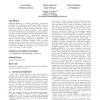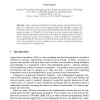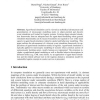JOS
2010
14 years 8 months ago
2010
There has been much discussion about why agent-based simulation is not as widely used as discrete-event simulation in Operational Research as it is in neighbouring disciplines suc...
100
click to vote
SMC
2010
IEEE
15 years 13 days ago
2010
IEEE
Abstract—This paper explores multi-operator supervisory control (MOSC) of multiple independent robots using two complementary approaches: a human factors experiment and an agent-...
118
click to vote
ATAL
2010
Springer
15 years 3 months ago
2010
Springer
Bushfire BLOCKS is a modular, distributed, agent-based simulation for exploring and informing bushfire response strategies. Separate independent modules capture the fire spread, e...
119
click to vote
WSC
2001
15 years 3 months ago
2001
The need for new theoretical and experimental approaches to understand dynamic and heterogeneous behavior in complex economic and social systems is increasing recently. An approac...
151
click to vote
AOIS
2003
15 years 3 months ago
2003
Abstract. Agent-oriented modelling of software systems and agent-based simulation are commonly viewed as two separate fields with different concepts and techniques. We show that th...
108
click to vote
WSC
2007
15 years 4 months ago
2007
Agent-based simulation is increasingly used to study systems in many areas of business and science. Using agentbased simulation for prediction could be very valuable. However, the...
134
click to vote
ER
2003
Springer
15 years 7 months ago
2003
Springer
Agent-oriented modeling of software and information systems and agent-based simulation are commonly viewed as two separate fields with different concepts and techniques. We argue t...
122
click to vote
KES
2005
Springer
15 years 7 months ago
2005
Springer
When developping multi-agent systems (MAS) or models in the context of agent-based simulation (ABS), the tuning of the model constitutes a crucial step of the design process. Indee...
115
click to vote
ANSS
2006
IEEE
15 years 8 months ago
2006
IEEE
To simulate adaptive agents with abilities matching those of their real-world counterparts, a natural approach is to incorporate adaptation mechanisms such as classical conditioni...
134
click to vote
GI
2007
Springer
15 years 8 months ago
2007
Springer
: Agent-based simulation can be viewed as methodical advancement and generalization of microscopic modelling styles in object-oriented and discrete event simulation well suited for...



